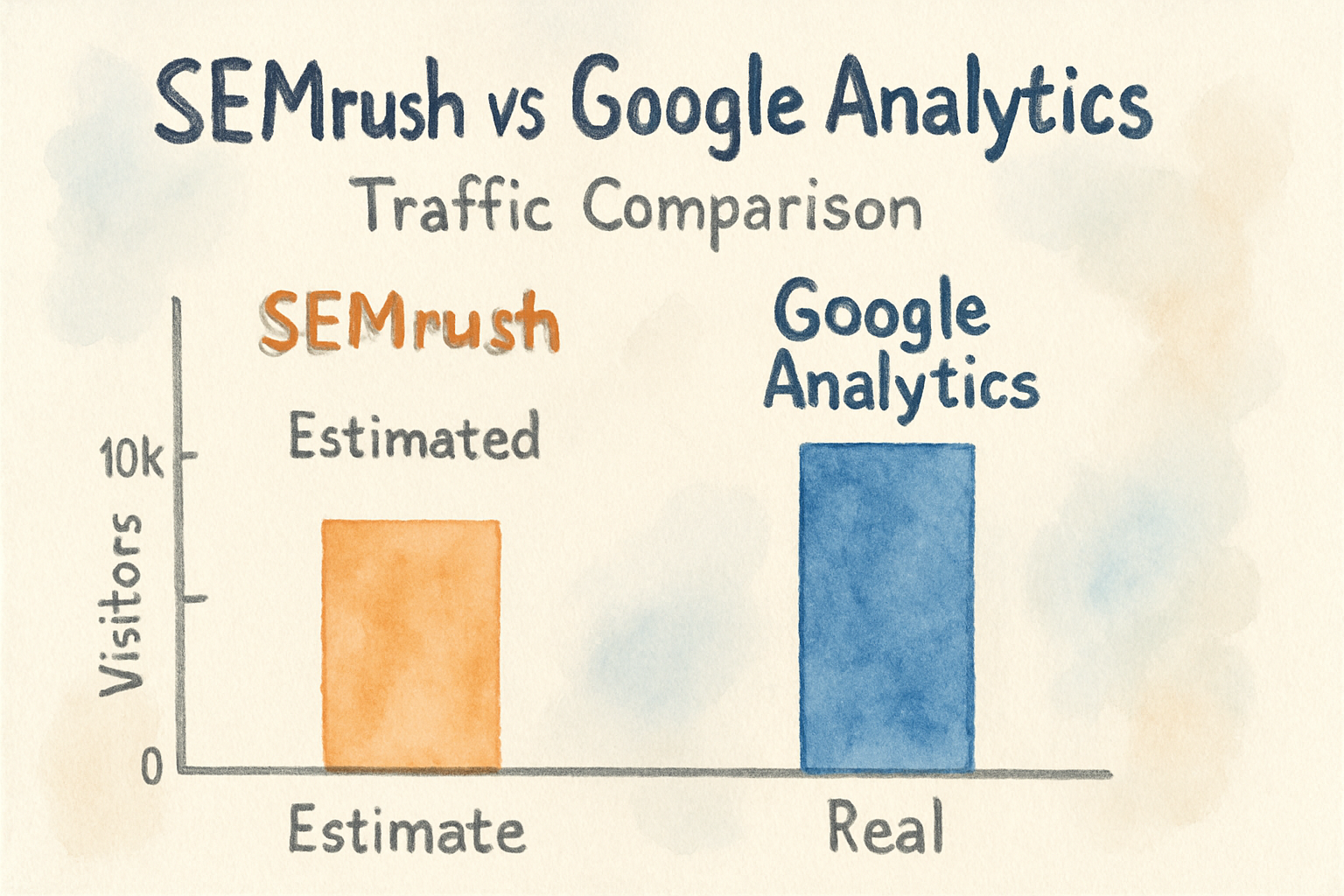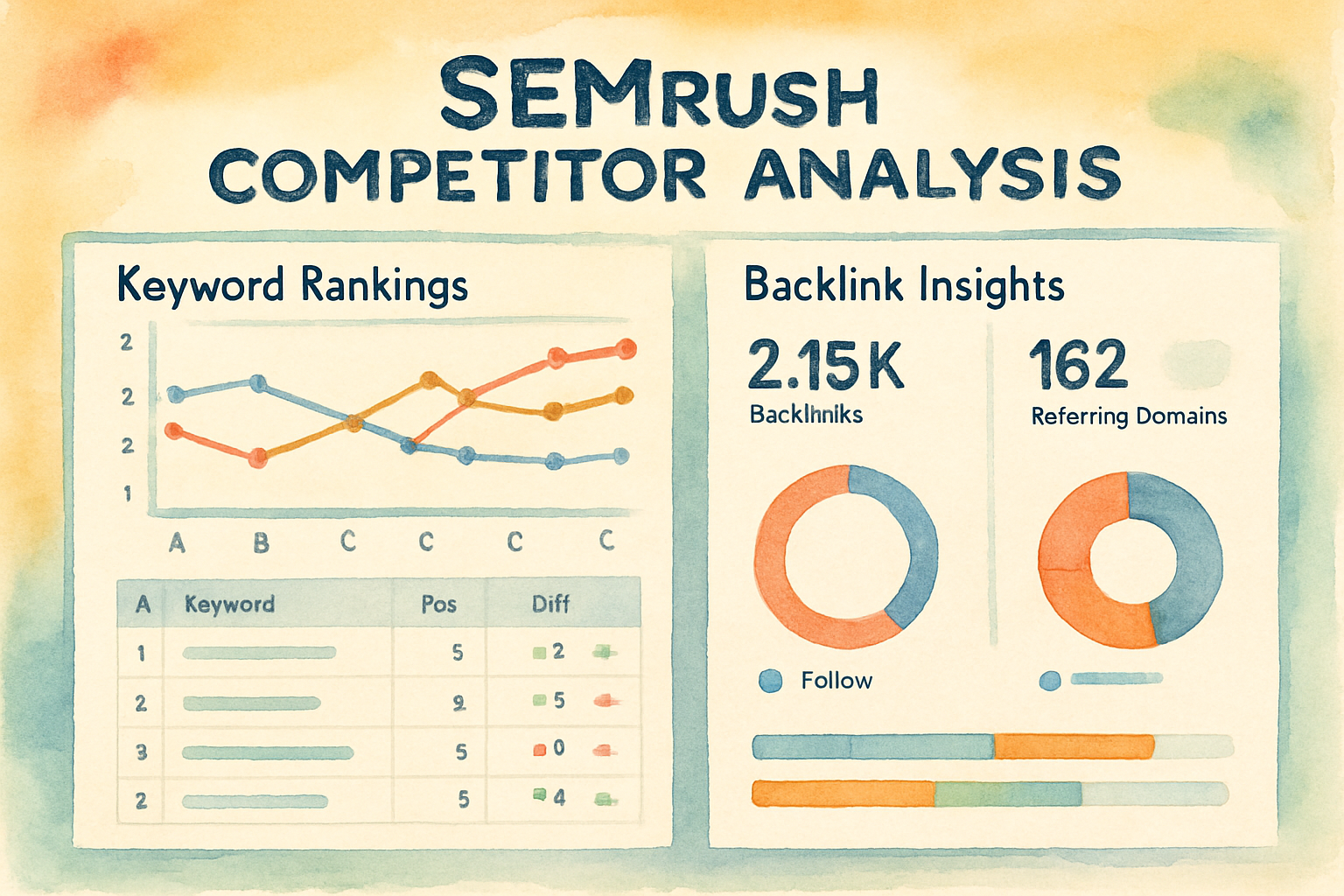It's a well-known fact that Semrush and Google Analytics are two cornerstone tools for marketers and website owners worldwide.
But what are they, exactly?
This comprehensive cheatsheet will break down everything you need to know about semrush vs google analytics.
Some are powerful for tracking your real-time website traffic.
Some excel at spying on competitors and uncovering keyword opportunities.
Some provide deep SEO audits to fix website issues.
Some are free but require direct access to your website.
Some estimate traffic data with smart algorithms.
Let's dive right in.
Introduction to Semrush vs Google Analytics
Both Semrush and Google Analytics are giants in the SEO and digital marketing world. But they serve quite different purposes.
Google Analytics is primarily a free tool designed to track and analyze your own website traffic. It works by embedding a tracking code on your site, delivering real-time data about who visits, how they behave, and what they interact with.
Semrush, on the other hand, is a comprehensive paid SEO tool that estimates traffic, analyzes keywords, and allows competitive intelligence — all without needing access to your or your competitor's website.
This fundamental difference often confuses beginners, so let’s dissect these tools with clear insights and detailed examples that'll help you decide which tool (or both) suit your needs best.
Why Does This Matter? Because each tool provides vastly different information, delivers it differently, and is meant to be used in distinct scenarios within your marketing strategy.
Traffic Insights: Real Data vs Estimates
Understanding your website’s visitor traffic is crucial.
Google Analytics collects *real* data via a tracking code installed on your own website. This means it records actual visitors, their behavior, sources of traffic, engagement metrics, and even conversions.
For instance, if your website got 471 organic visitors last month, Google Analytics reports that number based on accurate data from that tracking code.
Semrush estimates traffic by analyzing which keywords your site ranks for, their search volumes, and then calculates possible click-throughs based on ranking positions. For the same website, Semrush might estimate 41 organic visitors per month — which can feel misleading.
Why so different? Because Semrush uses statistical modeling rather than tracking real users. Its estimates improve significantly with larger traffic volumes — for massive sites with millions of visitors, these estimates are fairly reliable. However, for smaller to medium sites, estimates can be off by quite a margin.
"Think of Semrush’s traffic numbers as a weather forecast — they give you an idea but aren’t as pinpoint accurate as tracking the actual temperature yourself," says SEO expert Jenna Clarke.
Google Analytics shines with detailed breakdowns — you can see how many visitors come from organic search, paid ads, referrals, or direct sources. It even flags suspicious referral spam traffic you might want to exclude.
Semrush’s advantage: you don’t need to own or add code to a website to get any data on its traffic. This is a game-changer for competitor intelligence.

Keyword Research Capabilities
Keyword research is the backbone of effective SEO.
Google Analytics does show which keywords bring visitors to your site but with limitations. Since Google encrypts much of the search query data, many keywords are grouped under “(not provided),” leaving gaps in your understanding.
Moreover, Google Analytics only shows you data for your own website — it can’t tell you what keywords your competitors rank for or attract traffic from.
Semrush excels here. It enables you to discover high-volume keywords, analyze their search difficulty, track your and competitors' rankings, and find gaps in your SEO strategy.
You can identify valuable long-tail keywords, see which phrases drive the most organic traffic to your competitors, and create targeted content to capture that traffic. Better still, Semrush offers keyword intent, CPC data, and SERP features analysis.
Imagine knowing that your competitor ranks #1 for "best electric grills 2025" with massive monthly searches, while you’re invisible in results. Semrush lets you uncover this and plan accordingly.
For a more in-depth look at keyword research tools, consider the ultimate guide to keyword research tools from Rebelgrowth.
Competitor Analysis and Spy Features
This is where Semrush truly stands out.
Google Analytics confines you to analytics on your own property. While this is invaluable for internal insights, it does nothing to reveal competitor strategies.
Contrast that with Semrush, which lets you analyze competitors’ websites without any access or permissions. You can discover:
- Competitor traffic estimates (both organic and paid).
- Ranking keywords and their positions.
- Backlink profiles highlighting who links to them.
- Paid advertising strategies like Google Ads spend and keywords.
- Insights into competitor’s site structure, their top-performing pages, and content strategies.
For example, a company like Trager, known for grills, gets millions of visitors monthly — Semrush unveils their paid search spend, backlink quantity, branded vs non-branded traffic splits, and more.
This spy capability is a powerful weapon when your own marketing hits a plateau. Instead of guessing, you can follow the winning formula with your own twist.
Imagine discovering that your competitor invests heavily in a certain keyword cluster. You replicate but improve content quality and user experience to outmaneuver them.
Note that such external competitive intelligence is impossible with Google Analytics, which shows no third-party data. To see how to practically incorporate competitor research, check out this guide.

SEO Audits and Website Health Checks
Maintaining a healthy website is essential for SEO success. Both Semrush and Google Analytics offer tools in this space — but with distinct features and depth.
Google Analytics reports on behavioral metrics like bounce rate and average page load speeds. However, its ability to detect technical SEO issues is limited.
Semrush provides a comprehensive SEO audit tool that scans your site for:
- Crawling errors
- Broken links (404 errors)
- Missing or duplicate meta tags
- Duplicate content issues
- Page speed problems and mobile usability issues
- HTTP status errors and redirects
Semrush then generates actionable advice prioritized by impact, helping you fix critical problems to boost your rankings.
For businesses looking to stay technically sound, Semrush’s audit tool is invaluable. Google Analytics complements this by showing user interaction impacts caused by those issues.
Pro tip: Perform these SEO audits quarterly — spikes in issues often coincide with drops in organic traffic.
Integration and Pricing Overview
Let’s talk costs and convenience.
Google Analytics is free — no question. It only requires you to add a tracking code on your website. This makes it accessible for every business, from startups to large enterprises.
Semrush, on the other hand, is a premium tool starting at $13.95/month with plans scaling up depending on feature access. Its advanced SEO, PPC, content marketing, competitor research, and AI content generation features justify the investment for serious marketers.
One of Semrush's most powerful features is its ability to integrate with Google Analytics and Google Search Console. This sync aggregates your real visitor data with Semrush’s keyword and SEO data.
Connecting these tools allows you to see GA metrics like sessions and engagement within Semrush’s reports, crystallizing insights into your traffic sources and user behavior.
Here's how easy it is to link your GA4 property with Semrush in a project — a process that opens up new actionable reports.
For step-by-step setup, you can also explore the official Semrush documentation.
Best Practices: Should You Use One or Both?
Here’s a question to reset your focus: Can you afford to rely on just one tool in the dynamic SEO landscape of 2025?
The honest answer? Using both Semrush and Google Analytics offers the most comprehensive insight and strategic advantage.
Google Analytics gives you deep accuracy on your own traffic — where users come from, onsite behavior, conversions — making it essential for daily website monitoring and user experience optimization.
Semrush, meanwhile, provides the competitive edge — showing whom you compete against, what keywords to target, backlink opportunities, content gaps, and SEO health diagnostics beyond mere user traffic statistics.
You don’t have to break the bank right away. Start with Google Analytics to understand your visitors at no cost. Then selectively use Semrush for keyword research, competitor spying, and audits as your business and SEO goals grow.
For a detailed discussion on SEO budgets and when to invest in premium tools, check out the SEO Prices UK 2025 guide.
Step-by-Step Guide to Connect Semrush with Google Analytics
Integrating Semrush with Google Analytics (GA4) is simpler than you might think, and it unlocks valuable combined insights.
1. Log in to your Semrush account and go to your Project dashboard.
2. Click the gear icon (settings) in your project.
3. Select “Setup Google Account.”
4. Choose the GA4 property you want to connect. You’ll need to authorize access if not done before.
5. Optionally, connect Google Search Console from the same interface.
6. Save your changes.
7. Return to the Traffic Analytics or On-Page SEO Checker reports to view the integrated data.
This setup allows Semrush to pull your real traffic and engagement data directly from Google Analytics, making it easier to blend raw data with competitive intelligence for smarter decision making.
Keep in mind, your Semrush package level affects how much integrated data you can access.
This integration helps you see beyond estimates and monitor actual site performance alongside market trends.
Conclusion: Your Ultimate SEO Tool Strategy
In 2025, the debate of semrush vs google analytics is less about which is better and more about how they complement each other.
Google Analytics is your source of truth for visitor behavior, site performance, and conversion tracking.
Semrush equips you with the ability to spy on competitors, find profitable keywords, perform technical SEO audits, and optimize your content strategy.
Using them together creates a synergy that helps you understand your audience deeply while also mapping competitive opportunities — a must for businesses that want to dominate search rankings.
Whether you are a beginner or a seasoned marketer, mastering these tools and their integration is a powerful step forward.
For further SEO wisdom and related topics, explore guides such as Organic Traffic vs Paid Traffic and The Ultimate Guide to Local SEO for Electricians from Rebelgrowth to enhance your digital marketing skills.

What's Your Next Step?
Tell us in the comments: How will you apply this to your semrush vs google analytics strategy? For personalized advice, contact us!